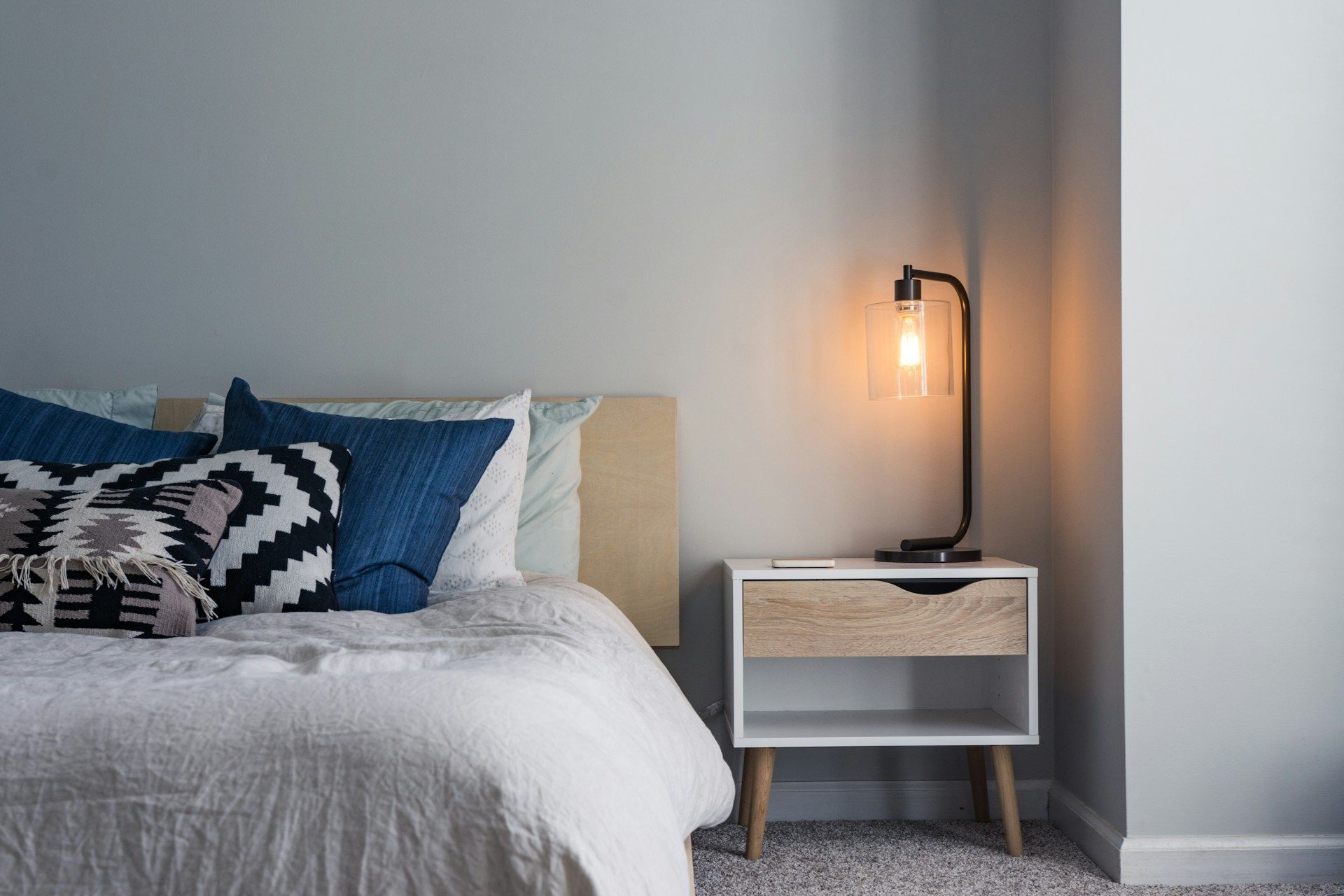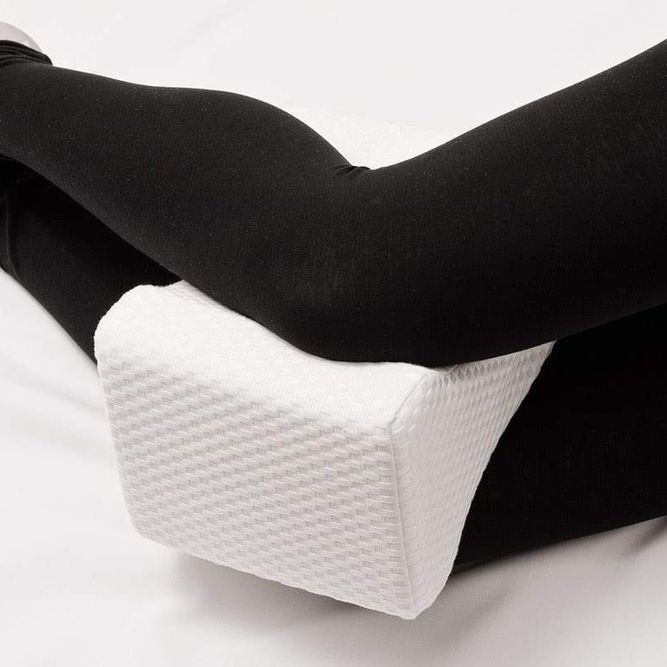How To Sleep Better During Menopause

Knowing how to sleep during menopause, surprisingly, isn’t as simple as you’d expect.
Whether you’re in menopause or perimenopause, sleep disturbances are (unfortunately) extremely normal, with up to 60% of women experiencing them.
However, understanding how to sleep better through a consistent schedule and an optimised sleep environment makes a world of difference. Let’s explore the causes and how you can achieve deep sleep regardless of your age.
Why Does Menopause Affect Sleep?
As oestrogen and progesterone levels decline during menopause, the body’s internal systems (such as those that regulate sleep) can become disrupted.
Oestrogen plays a role in regulating body temperature and maintaining steady serotonin levels, which in turn affect mood and sleep (Zhang et al., 2021). Progesterone has natural sedative qualities, so when these hormones fluctuate or drop, menopause sleep problems pop up.
Hot flashes and night sweats, two of the most common menopausal symptoms, can jolt you awake in the middle of the night, often soaked in sweat and uncomfortable.
Likewise, textbook insomnia becomes more frequent. You may also experience restless leg syndrome, joint pain, and difficulty achieving good-quality sleep.
Other hormonal issues, such as mood swings, anxiety, and depression, can further disrupt rest, leading to a never-ending cycle where poor sleep impacts your mood, and a low mood makes it harder to sleep.
In fact, studies show that interrupted sleep leads to a 31% mood reduction the following day (John Hopkins Medicine, 2025). Not ideal!
How To Sleep Better During Menopause
Poor sleep doesn’t have to be your new normal as you age. There are plenty of science-backed menopause sleep hygiene tips to help you drift off easier and stay asleep longer.
1. Establish A Consistent Sleep Schedule
First off, try to go to bed and wake up at the same time every day. Yes, even on weekends!
A consistent bedtime routine helps regulate your body’s internal clock and improves overall sleep quality.

2. Create A Relaxing Bedtime Routine
Winding down is essential. You can fall asleep without slowing down and preparing your mind and body for bed.
There are many ways to do this, but the most popular include taking a warm bath, reading a book, or trying gentle stretching before bed to signal to your brain that it's time to rest.
3. Optimise Your Sleep Environment
Next, it’s time to get your bedroom in order. Beyond making it a serene space, keep your bedroom cool, dark, and quiet. This can help with night sweats and insomnia during menopause.
A fan or white noise machine can help you drift off, as can breathable bedding materials like cotton or bamboo that wick moisture and reduce overheating.
Earplugs can also be a huge help if you're sensitive to noise.

4. Invest In Quality Pillows
It’s time to be like Goldilocks and find the right pillow for you.
Menopause can intensify joint pain, so supportive pillows and memory foam designs (like the Groove X Pillow) can make a huge difference.
You may also want to experiment with a body pillow for full-body support, or an adjustable pillow to find the perfect neck alignment for your height and body.
Shop Memory Foam Pillows5. Limit Exposure To Screens Before Bed
After a busy day, it’s nice to catch up on the news and social media. But don’t scroll too close to bedtime.
Exposure to blue light (from phone screens) can disrupt sleep patterns as it affects how the body produces melatonin, a sleep hormone (UC Davis Health, 2022).
Put your phone or laptop away 30 minutes to one hour before you sleep.
6. Watch Your Diet And Caffeine Intake
We have some bad news for foodies. Spicy foods, sugar, and caffeine (especially in the afternoon) can trigger hot flashes and impact sleep.
Take note of your eating habits and consider cutting back to see how your body responds.
7. Supplements
Some women find relief with magnesium supplements, which support muscle relaxation and reduce restless legs, or tryptophan, an amino acid that promotes melatonin production.
However, it is always advisable to consult a healthcare professional before adding new supplements and to purchase from trustworthy sources whenever possible.
8. Exercise Regularly
Moderate daily exercise can reduce menopausal symptoms and improve sleep.
Don’t worry, you don’t need to run a marathon. Daily walking, yoga, or swimming can yield great results. Just avoid vigorous workouts close to bedtime.
9. Relaxation Techniques
Lastly, experiment with regular relaxation techniques. These pair well with winding down for bed and make great additions to your nighttime routine.
Popular ways to relax include breathing exercises, meditation, or progressive muscle relaxation. Each can help ease anxiety and signal your body it’s time to wind down.
When To Consult a Healthcare Professional
If the lifestyle changes above don’t improve your sleep, it’s time to speak with a healthcare provider.
Sleep disorders during menopause are a real and valid concern. Treatments such as hormone replacement therapy (HRT), sleep-specific cognitive behavioural therapy (CBT), or non-hormonal medications (e.g., treatment for menopause leg pain at night) may offer significant benefits.
Last Thoughts
Understanding how to sleep better during menopause extends beyond simply lying in bed with your eyes closed. This period comes with very real challenges, but luckily, there are verified ways to improve your sleep and manage any other unsavoury symptoms.
Start today with the Groove X pillow to improve your nighttime comfort and sleep quality.
Or return to the Sleep Resources Hub for more advice and science-backed blogs.
References
- John Hopkins Medicine (2025). Depression and Sleep: Understanding the Connection. Johns Hopkins Medicine. [online] Available at: https://www.hopkinsmedicine.org/health/wellness-and-prevention/depression-and-sleep-understanding-the-connection.
- Salari, N., Razie Hasheminezhad, Amin Hosseinian-Far, Shabnam Rasoulpoor, Marjan Assefi, Sohila Nankali, Anisodowleh Nankali and Mohammadi, M. (2023). Global prevalence of sleep disorders during menopause: a meta-analysis. Sleep and Breathing, 27. doi:https://doi.org/10.1007/s11325-023-02793-5.
- UC David Health (2022). How Blue Light Affects Your Eyes, Sleep, and Health. [online] UC Davis Health. Available at: https://health.ucdavis.edu/blog/cultivating-health/blue-light-effects-on-your-eyes-sleep-and-health/2022/08.
- Zhang, Z., DiVittorio, J.R., Joseph, A.M. and Correa, S.M. (2021). The Effects of Estrogens on Neural Circuits That Control Temperature. Endocrinology, 162(8). doi:https://doi.org/10.1210/endocr/bqab087.

